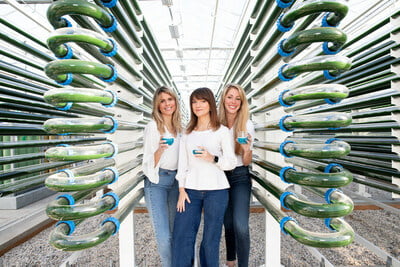Food-Tech Startup FUL Foods Taps the Planet’s Oldest Source of Life – Spirulina – To Reimagine the Future of Nutrition, Starting with FULwater

FUL Foods, the innovative Amsterdam-based food-tech startup, is proud to announce the launch of its groundbreaking product, FULwater, into the U.S. market. FULwater, a naturally vibrant blue functional water, represents a significant leap forward in environmentally efficient and functional nutrition. Led by a team of dedicated female entrepreneurs and passionate climate advocates, FUL Foods has revolutionized the nutrition industry by recycling CO2 and harnessing the power of spirulina, one of the most potent sources of nutrition on Earth, to create convenient and delicious food and beverage products.
Founded by a trio of visionaries, Julia Streuli, Cristina Prat Taranilla, and Sara Guaglio, FUL Foods brings together expertise from diverse backgrounds, including tech, engineering, energy, law, and finance, all united by a shared commitment to sustainability and innovation. Their collective efforts aim to make future-proof nutrition accessible to a wider audience through food and beverage offerings that prioritize both planetary and bodily renewal.
“At the heart of our inaugural product, FULwater, lies the essence of our proprietary ingredient – FULBlue. Our scientists have masterfully transformed this spirulina derivative into a powerhouse beverage, setting a new standard for functional waters with its unparalleled taste and absence of bitter aftertaste,” said Julia Streuli, CEO of FUL Foods.
The nutritional composition of FULwater is enriched with phycocyanin, renowned for its array of functional benefits, including antioxidant, anti-inflammatory, circulatory-boosting, immune-supportive, and detoxification properties. As such, FULwater aims to capitalize on the surging demand for functional water products and firmly establish itself in this rapidly growing market segment.
Integral to the creation of FULwater is the revolutionary production process devised by FUL Foods. This process consumes CO2 and converts it into a rich source of nutrition. Remarkably, the team can produce one ton of nutrition by utilizing just two tons of CO2, making it a remarkably efficient and sustainable approach. Unlike other sources of nutrition, such as plant-based staples like pea or soy that require arable land, FUL Foods’ spirulina is cultivated on top of buildings or even in the desert, making it a viable solution for the scarcity of arable land.
Cristina Prat Taranilla, CTO of FUL Foods, explained, “Our production process was designed with the planet in mind, utilizing fewer natural resources than almost any other source of nutrition. Our closed-loop growing system ensures minimal waste, and we recycle 85% of the water used in the cultivation process, contributing to water conservation.”
In addition to its impressive ecological footprint, FUL Foods’ spirulina nutrition is cultivated without the need for fertilizers or pesticides, which often lead to harmful chemical runoff and devastate natural water ecosystems. The company’s environmentally responsible practices set a new benchmark for sustainable nutrition.
FULwater stands out as a low-calorie, vegan, and non-GMO product, setting a new standard for shelf-stable spirulina-based beverages without artificial sweeteners. Consumers can now order FULwater’s daily Detox beverages online with nationwide shipping in the U.S. and purchase them from select retailers in Los Angeles, including Erewhon. As FUL Foods continues to expand, the company is actively exploring partnerships with retailers and food service providers to incorporate this unique ingredient into an array of products, including smoothies, juices, and snacks.
With FULwater, FUL Foods has unleashed a transformative product that not only embodies the future of functional nutrition but also leads the way towards a more sustainable and ecologically responsible food industry. As the world faces mounting environmental challenges, FUL Foods’ pioneering approach serves as a beacon of hope, demonstrating that innovation and sustainability can work hand in hand to create a brighter and healthier future for all.


Responses